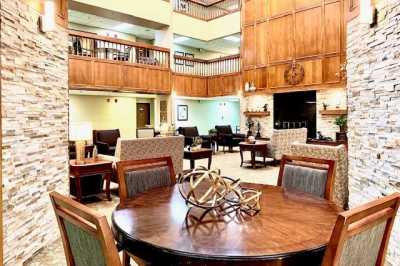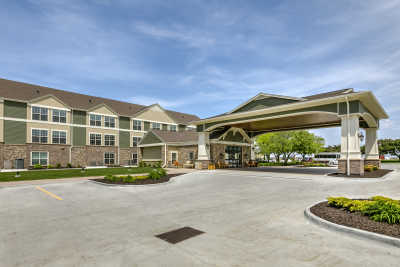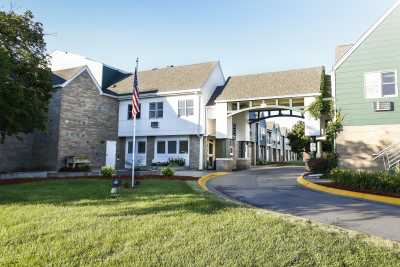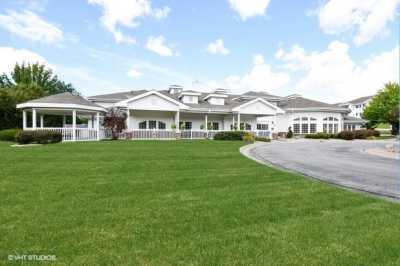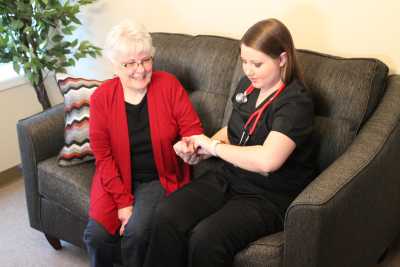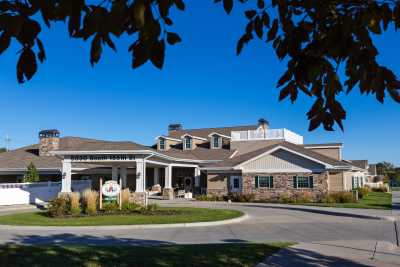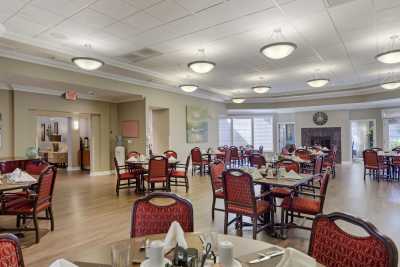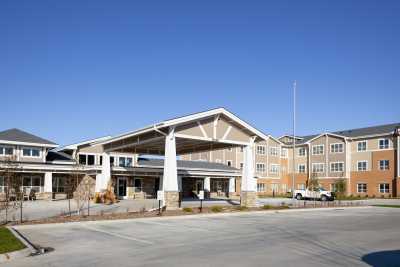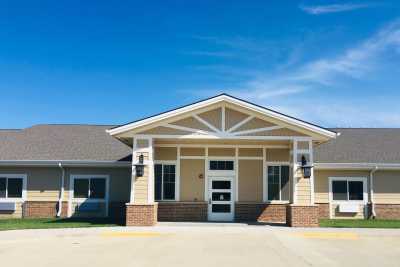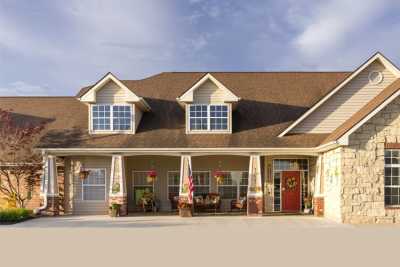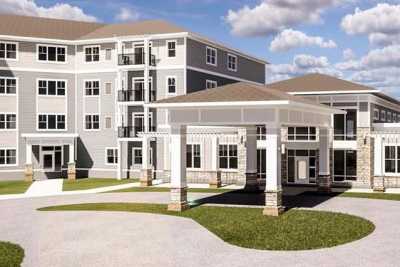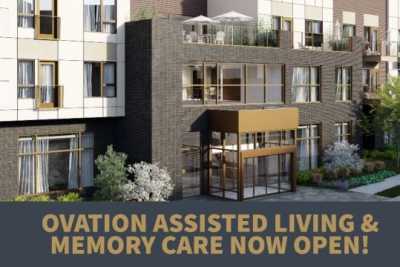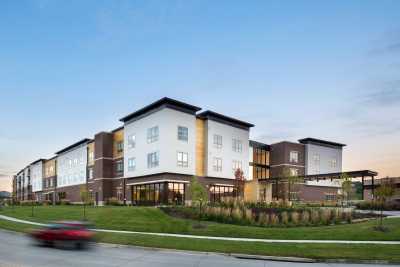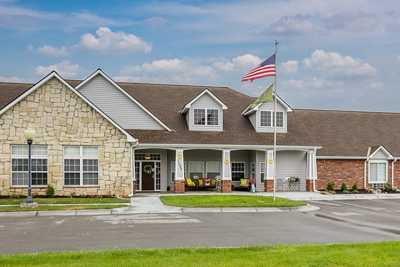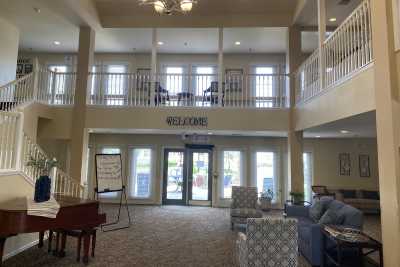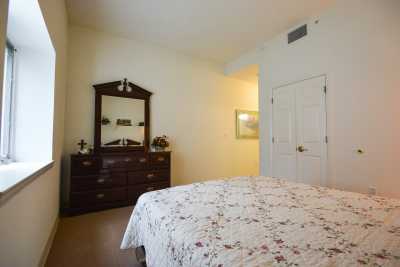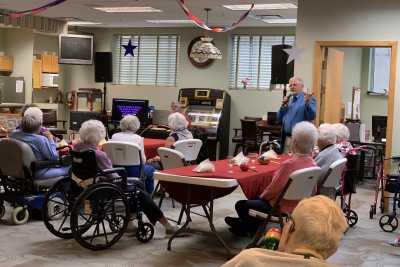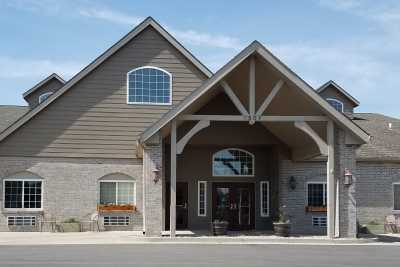
10 Best Assisted Living Facilities in Omaha, NE
Along the Missouri River lies the beautiful city skyline of Omaha, Nebraska, an ever-growing city with the largest population in the state. While Nebraska’s largest metro area may feel like a big city culturally, Omaha maintains a small-town charm that welcomes visitors and new residents of all ages. Compared to other cities across the United States, Omaha is a mid-sized city with an affordable cost of living. With a lower cost of assisted living than the national average, seniors in Omaha can feel at home in the comfort of any of the city’s budget-friendly assisted living communities. A Place for Mom partners with 18 assisted living communities within a 10-mile radius of the Omaha City Hall, and this radius includes Council Bluffs, Iowa.
Assisted living communities in the Omaha area help seniors receive assistance with activities of daily living (ADLs) like getting dressed or taking care of personal hygiene. The Omaha area offers stand-alone assisted living communities, as well as senior living communities with multiple care types — like independent living, assisted living, and memory care — on the same campus. Additionally, you’ll find that Omaha offers devotional services and social opportunities for your loved one.
A Place for Mom has compiled information from our partner assisted living communities to create this all-inclusive guide to assisted living in Omaha. You’ll learn more about how seniors may pay for assisted living, what benefits your loved one may qualify for, and what type of regulations and laws a senior care facility must follow. Additionally, you’ll get a glimpse into living on the border of Nebraska and Iowa.
Omaha Assisted Living Facilities | 666 Reviews
We selected Crown Point not because it was the best of all the other ones, but it was close to my home which made it convenient for me to visit. The price was right and the staff was excellent. My Wife...
Staff have been super friendly and are always getting my mom involved in activities. Facility is on the smaller side which is why we choose Westgate.
Nice facility, close to where I live. Most staff are friendly. Things they could improve...more drink choices & ice in the glasses at meal time. Offer fresh ice water for residents morning & afternoon in...

The facility has a safe atmosphere, good food and wait staff, rooms are clean, but small. My wife was there for a month, and she felt comfortable and made friends. Nice courtyard, root beer float Wednesdays,...
The environment is very laid back, there are lots of families coming and going. The apartments are basic, but very nice. The dining experience is always busy and friendly.
Very helpful with drug dispensary. Brought the right dose multiple times each day when I was not available to monitor. The food was great. Nice variety as well as quality. Took care of laundry weekly but...
It's a beautifully designed and decorated place that truly focuses on the social aspect of quality living for older adults. One Friday I was there, there was live music and drinks in the main area and it was...
I would absolutely recommend to others. Mom says the food is amazing and she's had great experiences since moving in. Mom is very introverted and they've done an excellent job inviting her to participate in...
The staff and directors have gone above and beyond with the transition of my dad to this facility. The residents are always friendly and they have adequate activities to keep them entertained daily. I feel...
We chose Parsons House because they were the only ones who were willing to accept my son. They have been great to work with and very accommodating. I would recommend them to others who are looking
Our free advisors can help
- Compare local facilities
- Determine care type
- Schedule tours
- Evaluate pricing
What we like a lot about the St Joseph Tower community is all the different activities they have going on for the residents, like cards and bingo nights. Based on the experience we have had so far, we would...
Overall experience was 4. I would give 5's to Cleanliness, friendliness, food, Administrative staff and activities. Quality of care was good overall (4 rating) but too often had to wait quite a while or...
5 on all. Great experience. Staff is awesome. I definitely would recommend this community to other families. My dad has passed away, but while he was there they took amazing care of him!!
Physically the building and layout is very nice. With a few exceptions the staff are very friendly and good with the residents. The staff don't always pay sufficient attention to the specific needs of...
Great community. No pressure to move in. Staff is amazing. Pet friendly. Great activities for the members. Slow and patient with new members. Engaging. Front office is very open with family members.
What they could improve on would be more outings, but yes we would recommend Bickford of Omaha Hickory to other families based on the experience we have had so far.
What we like the most about The Brant is the cleanliness, friendliness and activities provided. Varying daily menu. We would absolutely recommend this community to other families based on the experience we...
Overall experience is/was a great experience. They took time, answered my questions and seemed genuinely wanting to help. Cleanliness is excellent. From, front door, offices, dining and other rooms. And...
This center is the place that all families dream about for their loved one who needs the care they can no longer give. I visited my great aunt and was so pleased to see her so happy and well cared for by an...
A month after we decided on Bickford, we moved my dad there, and it was a great fit. My dad enjoyed the last six months of his life there, and I was able to visit often. Bickford called me a few times when...
The food was always important to [name removed] when he stayed in respite care and he liked it there. The head staff people are so amazing! We have experienced the staff at [community name removed] and now...
My mom was a resident for almost five years at House of Hope. I was very pleased with the care she received. She felt safe in her own 'apartment' and the core staff were long-term and consistent. ...
Love Via Christie!! The Via Christie staff all go way beyond what is expected to make their residents feel at home and safe at all times. Very comforting to know my dad is being well cared for. Thank you to...
My mom has lived here for 5 years and has loved every moment of it. She started in independent living and has since transitioned to the assisted living area of the building. She loves being under the same...
The staff is really caring, they love our loved one and whenever they have spare time they come to her room just to chat with her. She is in the top level of care and they have great communication.
Our methodology
How we rank order the Omaha community options above
We developed a proprietary recommendation system that orders Omaha community options based on factors we know are important to seniors and their families:
- Proximity to your search location
- Availability of recent, high-quality reviews
- The amount of detailed community information available
Where we source our information
14,000+ communities
We collect proprietary data from our network of 14,000+ senior living communities in the U.S., with regular refreshes of data and information
350,000+ reviews
We have 387,000+ reviews from senior living residents and family members that provide first-hand accounts about senior living communities
- Costs of assisted living in the Omaha area
- What families are saying about assisted living in Omaha
- How people pay for assisted living in Omaha, NE
- Understand Omaha laws and regulations for assisted living facilities
- What to expect from assisted living in Omaha
- Omaha assisted living services and amenities
- Explore senior care with confidence
- Unfamiliar with Omaha? Highlights for seniors
Costs of assisted living in the Omaha area
The average cost for assisted living in Omaha is approximately $4,600 per month, according to A Place for Mom’s proprietary data. This cost is what seniors actually pay with the inclusion of add-on fees and services. The cost for assisted living varies according to the location and size of the apartment. For example, the median starting price for a studio apartment in an Omaha assisted living facility is approximately $3,900 per month. However, this increases as the size of the apartment enlarges, so the median price for a two-bedroom assisted living unit is approximately $5,400 per month.[01] In addition to rent, amenities and services can cause a change in the monthly fees.
For assisted living facilities, services typically include the following:
- Assistance with activities of daily living
- Medication management
- 24-hour awake staff
- Incontinence care
- Housekeeping
- Laundry services
- Grocery shopping and errand services
Many communities also include transportation services; however, this may be considered an add-on service, depending on the community.
Here’s a list of common amenities at assisted living communities, according to our Omaha partners:
- Beauty salon
- Outdoor walking paths
- Secured community
- Barber shop
- Fitness center
- Arts and crafts center
- Billiards lounge
- Golf course or putting green[01]
Below, you’ll find the average baseline costs for assisted living in the area (these costs do not include additional fees).
Average monthly cost of Assisted Living in Omaha, NE vs. nearby cities
Average monthly cost of Assisted Living in Omaha, NE vs. the state and national average
Average monthly cost of Assisted Living in Omaha vs. other types of senior living
Median monthly costs of Assisted Living in Omaha, NE by room type
Average cost of Assisted Living in Omaha over time
What families are saying about assisted living in Omaha
Recent reviews for assisted living in Omaha
Amelia Senior Living in Council Bluffs, IA
Chapters Living of Council Bluffs
Bailey Pointe at Miracle Hills in Omaha, NE
Omaha review score based on 177 family reviews
This proprietary review score is based on 177 reviews of 45 Omaha assisted living communities. All reviews were submitted in the past two years by verified community residents and family members.Omaha review score compared against nearby cities
Review subcategories for Omaha assisted living
When assisted living residents and family members submit a review on our site, they rate each community on categories such as cleanliness, activities, meals, and more. The chart below is based on 177 reviews of 45 Omaha assisted living communities. This chart helps you compare Omaha resident and family assisted living satisfaction rates against national averages. Use it to assess your needs and develop criteria for your own search. If you know that one of these categories is important to you or your loved one, our senior living advisors can help you find communities to match your needs.How people pay for assisted living in Omaha, NE
Between private pay methods and public assistance, seniors and their families have multiple options to help cover the cost of assisted living. Many seniors use a mixture of private payments, like income and savings, with public resources. Since assisted living includes care, seniors may be able to use resources like Medicare and Medicaid to help cover the costs. Additionally, qualified veterans may use veterans benefits towards assisted living costs.
Seniors may use private pay methods like savings, Social Security benefits, pensions, and investment returns to pay for assisted living. In addition, seniors may use the following methods:
The Omaha area is home to a handful of military bases and reserve units, which means you’ll find a number of different resources in the area for local veterans. The U.S. Department of Veterans Affairs (VA) helps veterans and their surviving spouses with benefits that can help them pay for assisted living costs.
What are VA benefits?
There are a wide range of veterans benefits with different qualifications. One of the most generous benefits is the Aid and Attendance benefit. And while these veterans benefits are helpful, eligibility requirements can get complicated. Prior to the application process, it’s important to seek help to understand what benefits your loved one may qualify for. Local Veterans Service Officers (VSOs) and VA-vetted nonprofit organizations can help veterans understand, apply, and file claims for benefits.
What local veteran benefits are there in Omaha?
Nebraska and Iowa have local veterans benefits to help veterans with property taxes and retirement benefits. In Nebraska, your loved one may benefit from the following:
- Military Retirement Benefits Exclusion helps excuse military retirement benefits from veterans’ taxable income as of 2022.
- Nebraska Homestead Exemption is a property tax relief program for homeowners, including but not limited to seniors aged 65+, disabled veterans, and surviving spouses of disabled veterans.
Iowa has similar veteran benefit programs, including, but not limited to the following:
- Disabled Veteran’s Homestead Tax Credit helps Iowa veterans who are 100% disabled due to their service. This credit offers exemption from property taxes.
- Military Retirement Tax Exemption offers to exempt federal retirement pay from state income tax as of 2014.
Number of veterans who live in Omaha
About 43% of Omaha veterans are 65+
Resources for Omaha veterans
Douglas County Veteran Service Office
Service Officer: Benson Elmore
1111 S 41st St., Suite 110
Omaha, NE 68105
Phone: 402-444-7180
Email: benson.elmore@douglascounty-ne.gov
Nebraska Department of Veterans’ Affairs (NDVA)
P.O. Box 95083
301 Centennial Mall South, 4th Floor
Lincoln, NE 68509-5083
Phone: 402-471-2458
Fax: 402-742-1142
Email: ndva@nebraska.gov
Veterans’ Affairs State Service Office
3800 Village Drive
Lincoln, NE 68516-4737
Phone: 402-420-4021
Fax: 402-471-7070
Email: ndva.sso@nebraska.gov
Veterans of Foreign Wars (VFW) office
Post 247 St. Mihiel Post
1044 S. 25th St.
Omaha, NE 68105
United States
Phone: 402-968-3447
Disabled American Veterans (DAV) offices
General Mac Arthur #2
4515 F St.
Omaha, NE 68117
Phone: 402-731-4088
William V Brooks #47
2702 Fontenelle Blvd.
Omaha, NE 68104
Phone: 402-557-7822
American Legion offices
NE Post 0331
4830 S. 21st St.
Omaha, NE 68107-2801
Phone: 402-731-5158
Email: 331adj@post331.omhcoxmail.com
NE Post 0037
1329 O St.
Omaha, NE 68107-3056
Phone: 402-731-8814
Email: raider823@msn.com
NE Post 0001
7811 Davenport St.
Omaha, NE 68114-3628
Phone: 402-391-6764
Email: post1@amlegionpost1omaha.org
Pottawattamie County Veteran Affairs office
623 Sixth Ave.
Council Bluffs, IA 51501
Phone: 712-328-5726
Hours: Monday through Friday, 8 a.m. – 4:30 p.m.
Iowa Department of Veterans Affairs
Camp Dodge – Building 3465
7105 NW 70th Ave.
Johnston, IA 50131-1824
Phone: 515-252-4698
Veterans of Foreign Wars (VFW) office
Post 737 Grenville M. Dodge Post
716 S. Fourth St.
Council Bluffs, IA 51503-6537
Disabled American Veterans (DAV) office
Col Don Macrae #5
716 Fourth St.
Council Bluffs, IA 51503
Phone: 402-740-3619
Council Bluff’s American Legion office
IA Post 0002
716 S. Fourth St.
Council Bluffs, IA 51503-6537
Phone: 712-325-4874
Email: rainbowpost2@gmail.com
Both Nebraska and Iowa offer Medicaid, a state health insurance program for low-income seniors who meet eligibility requirements. While Nebraska Medicaid and Iowa Medicaid don’t cover room and board costs, these programs can help cover medical care. Additionally, there are home and community based service programs that help cover certain care costs that assisted living communities offer.
Both Nebraska Medicaid and Iowa Medicaid offer the Program of All-Inclusive Care for the Elderly (PACE) to seniors aged 55 and older who need a nursing home level of care. This helps cover health care and long-term care services, which may include the following:
- Physical and occupational therapy
- Medical specialty services
- Prescription drugs
- Adult day primary care
- Meals
What waivers does Nebraska Medicaid offer?
Nebraska Medicaid has multiple home and community based services waivers, two of which apply to seniors aged 65 and older. This includes the Aged and Disabled program, which offers coverage for assisted living services, but will not cover room and board costs. The program also helps cover services such as:
- Assistive technology
- Personal care
- Personal emergency response system
- Transportation
- Adult day health
- Chore service
- Companion
- Home delivered meals
- Home and vehicle modifications
- Independence skills building
Another program offered by the home and community based service waivers is Personal Assistance Services, which provides in-home assistance with activities of daily living to adults who have a chronic condition or disability. Seniors aged 60 and older can receive help finding resources, creating a personalized care plan, and establishing services thanks to the Eastern Nebraska Areas on Aging Care Management Program.
What waivers does Iowa Medicaid offer?
Similar to Nebraska, Iowa Medicaid has an Elderly Waiver, which offers comparable coverage to Nebraska’s Aged and Disabled program. Seniors aged 65+ who require a nursing home level of care may be eligible for this program, which helps cover assisted living services to those who reside in a noninstitutional setting.[01] The waiver also helps cover similar services, such as those below:
- Assistive devices
- Adult day care
- Emergency response systems
- Nursing care
- Transportation
- Home and vehicle modifications
- Home health aides[03]
This waiver also covers Consumer Directed Attendant Care, which offers additional professional assistance in your loved one’s home or community. This type of care can include skilled or unskilled services, like assistance with activities of daily living (ADLs). Since assisted living communities provide assistance with ADLs, your loved one may not need this additional unskilled care. However, your loved one may want extra skilled care offered by a licensed nurse or therapist, which may include the following:
- IV Therapy
- Catheter care
- Therapeutic diets
- Monitoring medications
- Administering injections
- Recording vital signs
Where to find assistance with Medicaid benefits
While Medicaid benefits are extremely helpful, they can be difficult to understand, and filling out applications can be tiresome. Nebraska and Iowa have local Departments/Offices on Aging to help your loved one understand and apply for Medicaid benefits. Additionally, the local ombudsman can help advocate for seniors and keep them informed on health insurance issues. Below you’ll find more information on local resources and programs.
Omaha resident Medicaid resources
Apply for Nebraska Medicaid.
301 Centennial Mall South
Lincoln, NE 68509
Phone: 402-471-3121
Medicaid assistance: 855-632-7633
P.O. Box 95026
Lincoln, NE 68509-5026
Phone: 402-471-2307
Email: DHHS.Aging@nebraska.gov
4780 S. 131st St.
Omaha, NE 68137
Phone: 402-444-6536
Phone: 800-338-8366
Hours: Monday through Friday, 8 a.m. – 5 p.m.
Council Bluffs Office
231 S. Main St.
Council Bluffs, IA 51503
Phone: 712-328-2540
800-432-9209
Medicare is a federal health insurance program that helps cover health care costs for seniors aged 65 and older, as well as adults with permanent disabilities or certain diseases. While Medicare does not cover assisted living boarding costs, it can help cover medical costs associated with assisted living. However, coverage depends on the type of care plan you choose.
Financial assistance programs
Both Nebraska and Iowa have financial assistance programs, like Medicare Savings Programs, which help low-income families and/or seniors pay for Medicare costs. Nebraska and Iowa residents can also receive help paying for prescription drug costs and Medicare Plan D fees through Medicare’s Extra Help program. For additional help with prescription costs, Nebraska residents can sign up for a free discount prescription program called Douglas County Prescription Discount Card.
How to understand and apply for Medicare benefits
While understanding Medicare benefits is a long and difficult process, the coverage is well worth it. To help ease any confusion, Nebraska and Iowa offer help provided by counselors and/or volunteers through the following programs:
- Nebraska State Health Insurance Assistance Program (SHIP)
- Iowa Senior Health Insurance Information Program and Medicare Patrol (SHIIP-SMP)
In addition to these programs, Nebraska and Iowa counties have a long-term care ombudsman that provides information on health insurance issues and advocates for senior rights.
Omaha resident Medicare resources
Omaha: Beth Nodes
Phone: 402-444-6536
402-561-2239
Email: beth.nodes@enoa.org
Iowa: Julie Pollock
Phone: 712-249-7424
Volunteers Assisting Seniors
1941 S. 42nd St., Suite 312
Omaha, NE 68105
Phone: 402-444-6617
Understand Omaha laws and regulations for assisted living facilities
Assisted living communities in Nebraska and Iowa have an extensive list of laws and regulations they need to follow to operate as a senior care facility. Below you’ll learn more about the differences between the requirements Nebraska and Iowa have for assisted living facilities.
Nebraska laws and regulations for assisted living facilities
Assisted living facilities in Nebraska must have a license from the Department of Health and Human Services. These licenses must fall under the Assisted-Living Facility Act and the Health Care Facility Licensure Act. Every facility and/or care service must have a separate license, even if they reside on the same campus. Prior to and after the approval of a license, assisted living facilities are inspected by the Department of Health and Human Services.[04] Inspection reports are available online through a license search engine through the Nebraska Department of Health and Human Services. In addition to licensing requirements, Nebraska requires assisted living facilities to meet certain regulations.
Staff requirements
Assisted living facilities in Nebraska need a sufficient amount of staff members. However, Nebraska law does not specify what qualifies as a sufficient amount. All care staff members must undergo a two-week orientation and complete at least 12 hours of ongoing training per year. Assisted living communities must also staff a registered nurse who can train medication aides and oversee medication administration policies.[04]
Facility requirements
Assisted living facilities must comply with building codes and follow an extensive list of requirements, including but not limited to the following:
- Passageways are wide enough and have assistive devices.
- Stairways and ramps with handrails.
- Private rooms have doors that offer privacy but also accessibility in case of an emergency.
- An outdoor area is available for residents.
Additionally, resident units in assisted living facilities must meet square-footage requirements. Besides facility safety requirements, assisted living facilities must follow multiple regulations for utilities and common areas, such as the following:
- Clean and safe facilities and grounds are maintained.
- Adequate lighting, temperature, and sound levels are provided.
- A pest-free environment is maintained.
- Common areas and sleeping areas are furnished.
- Running water at comfortable temperatures is provided.
Besides utility regulations, assisted living communities have multiple requirements for specific apartment and facility features for bathing rooms, toileting rooms, and bedrooms. The standards are as follows:
- A bathing room must have a tub and/or shower.
- A toileting room must have a toilet and sink for every bedroom.
- A bedroom cannot be located in a garage, storage area, shed, or similar detached buildings.
- A bedroom has to be a single room in an apartment.
However, the only requirements for kitchens within an apartment is that a bathing room cannot open into a dining area or kitchen.[04]
Residents’ rights
When living in a Nebraska assisted living facility, seniors have a long list of rights aimed to help protect them. Your loved one has many rights as a resident, which include, but are not limited to the following:
- Being treated respectfully by the care staff
- Receiving written information on pricing/rates
- Administering medication, if safe
- Choosing a personal physician
- Having visitors, if they don’t affect other residents’ safety or rights[04]
Iowa laws and regulations for assisted living facilities
Assisted living facilities go through a few different programs to become licensed as an assisted living program in Iowa. These programs start with a conditional certification. Within three months of this certification, the facility undergoes an inspection by the Department of Inspections and Appeals. After approval, the facility is licensed for two years with an inspection conducted every other year. However, residential care facilities must have an inspection every 30 months.
While assisted living programs are designated for three or more residents, residential care facilities are in a more private residence with less than four occupants. Additionally, Iowa law notes that assisted living programs are typically for the elderly population, while residential care facilities are usually for younger adults with disabilities or mental illnesses. However, residential care facilities are still available for seniors, but may just be less common.[05] Nonetheless, inspection reports for assisted living facilities are available through the Direct Care Worker Registry and Health Facility Database.
Staff requirements
Assisted living facilities in Iowa are required to have a sufficient number of staff members who are available 24-hours a day. Iowa law does not specify what qualifies as a sufficient number of staff members, but it does state the type of staff members required. The staff requirements includes personnel who assist with activities of daily living, as well as a program manager to supervise staff and operations. If the program includes medication administering services or health care services, they must staff a registered nurse. All nurses and program managers are required to complete a nursing course or assisted living management course.[05]
Facility requirements
Whether the room is private or semi-private, apartments provided in assisted living programs must include a bathroom with the following appliances:
- Sink
- Bath or shower
- Toilet
However, kitchens are optional for assisted living programs in Iowa.[05]
In addition to apartment regulations, facilities have limitations on the type of residents they’re allowed to admit. Assisted living programs cannot admit certain seniors, such as a senior who falls into one of the following categories:
- Requires complete assistance with four or more ADLs for over 21 days
- Is bedbound
- Needs two-person assistance with standing or transferring
- Requires over part-time or intermittent health care services for over 21 days[05]
How to learn more about assisted living laws and regulations
Both Nebraska and Iowa have separate laws and regulations for assisted living facilities that also offer dementia care.[04,05] To learn more about those memory care regulations, read our Omaha memory care page. Additionally, if you’d like to learn more about assisted living facilities laws and regulations in Nebraska, visit the state Department of Health website. In Iowa, visit the Iowa Department of Inspections and Appeals website.
Nebraska Department of Health contact information
Visit the Nebraska Department of Health website to learn more on assisted living facilities.
Search for licensed assisted living facilities.
301 Centennial Mall South
Lincoln, NE 68509
Phone: 402-471-3121
Iowa Department of Inspections and Appeals contact information
Learn more about Iowa’s assisted living regulations.
Look up Iowa’s licensed assisted living communities.
Lucas State Office Building, 3rd Floor
321 E. 12th St.
Des Moines, Iowa 50319-0083
Phone: 515-281-7102
COVID-19 regulations for Omaha assisted living facilities
Both Nebraska and Iowa have followed the recommendations of the Centers for Disease Control and Prevention and have relaxed their COVID-19 guidelines. While Iowa recommends isolating up to 10 days after a positive COVID-19 infection test, Nebraska has slightly more specific regulations.[06]
The Nebraska Department of Health recommends the following for people who have isolated for five days after a positive COVID-19 infection test:
- If you or your loved one did not have any symptoms, end isolation.
- If you or your loved one did have symptoms and have been fever-free for 24 hours, end isolation and continue wearing a mask.[07]
Once your loved one has tested negative on a COVID-19 antigen test twice — taken 48 hours apart — they can stop wearing a mask. However, if after day 11 they are symptom free, they can stop wearing a mask. In addition to these recommendations, Nebraska encourages getting the COVID-19 vaccine through Finish Strong Nebraska, the state’s official vaccination campaign.
As of July 2021, assisted living facilities in Nebraska do not require masks for fully vaccinated residents. However, they recommend that unvaccinated residents should wear masks and social distance.[08]
What to expect from assisted living in Omaha
Whether your loved one wants to age in place or enjoys devotional activities and religious services, assisted living communities in the Omaha area offer different types of environments.
Stand-alone assisted living communities vs. multilevel care types
Our partners in Omaha offer both stand-alone assisted living facilities and communities with multiple care types on the same campus. A majority of our partners in Omaha offer multiple care types, including independent living, assisted living, and memory care. The remaining seven out of our 18 assisted living partners are stand-alone assisted living communities.[01]
Quality care
A majority of our assisted living partners in Omaha have customizable care plans, which helps provide the exact care services your loved one needs. Additionally, all of our Omaha assisted living partners have visiting medical professionals, like those listed below:
- Dentists
- Nurses
- Occupational therapists
- Physical therapists
- Speech therapists
- Podiatrists
Besides these medical professionals, most of our partners have licensed nurses to administer injections with a doctor’s approval.[01]
Social opportunities
Approximately 83% of our assisted living partners in Omaha have an activity director to create a calendar full of life-enriching activities.[01] Here are some popular activities that may be included:
- Live musical performances
- Trivia games
- Tai chi lessons
- Stretching classes
- Yoga exercises
- Happy hours
- Art classes
- Cooking classes
- Pet-focused programs
- Day trips/outings
In addition to stimulating activities, communities encourage socialization among seniors with programs such as the following:
- Book club
- Bridge club
- Gardening club
- Walking club
- Quilting/sewing club
Devotional and religious services
While only one assisted living partner is labeled as a faith-led assisted living community, many of our partners include religious services. Roughly half of our assisted living partners have a visiting chaplain or priest. However, a majority of our assisted living partners have devotional services available on-site. In addition to these services, at least one of our Omaha partners have some other regular religious services, including Christian, Jewish, and Mormon faiths.[01] Besides on-site religious services, the Omaha area is home to many churches, offering easy access to off-site worship.
Assisted living in the surrounding Omaha suburbs
Most seniors gravitate toward Omaha, but many people prefer a surrounding suburb. About a third of the people we referred between Jan. 2022 and Feb. 2023 were looking outside of Omaha, with the furthest location being 23 miles from Omaha Civic Center. However, a majority of seniors were looking within 11 miles of the Omaha Civic Center. The second most popular location in the Omaha region was Council Bluffs.[01]
A majority of our assisted living partners in the area are located in the city of Omaha. However, even within 10 miles of downtown, there are five assisted living facilities just outside the Omaha city limits. This includes partners in surrounding suburbs like Council Bluffs, Bellevue, La Vista, Elkhorn, and Bennington. These assisted living facilities are multilevel care type communities with at least one additional care type available on the same campus. Some have assisted living and memory care services, while others offer independent living, assisted living, and memory care services.
Omaha assisted living services and amenities
Availability of select care services in Omaha assisted living
Availability of select dementia care services in Omaha assisted living
Availability of select dietary accommodations in Omaha assisted living
Availability of select dining options in Omaha assisted living
Availability of select programs and activities in Omaha assisted living
Explore senior care with confidence
Know where to start.
Identify the right care for your loved one with our free assessment.

See what you can afford.
Understand cost and payment for long-term care based on your loved one's needs.

Find top facilities for you.
Free, personalized guidance from our Senior Living Advisors can help you narrow your search.

Tour your favorite facilities.
Our free touring checklist can help you choose the right community.
Unfamiliar with Omaha? Highlights for seniors
Number of seniors over the age of 65 currently living in Omaha
Percentage of seniors 65 and older within the Omaha population
Average annual income for Omaha seniors 65 and older
Health care for seniors in Omaha
Between geriatric programs and clinics, seniors in the Omaha area can find quality care catered to their needs. Here you’ll find the most notable hospitals that receive the highest rankings in the region.

Nebraska Medicine-Nebraska Medical Center
Nebraska Medicine-Nebraska Medical Center offers top-notch care and is ranked No. 1 in Nebraska and Omaha, according to U.S. News and World Report. Seniors can also receive geriatric medicine and psychiatry services through the hospital’s geriatric clinic, Home Instead Center for Successful Aging. Additionally, the hospital is highly rated for multiple adult specialties, including cancer, gastroenterology and GI surgery, orthopedics, and pulmonology and lung surgery.

Nebraska Methodist Hospital
Nebraska Methodist Hospital provides exceptional care and is ranked No. 2 in Omaha and No. 3 in Nebraska, according to U.S. News and World Report. Seniors have access to specialized care through the hospital’s Geriatric Assessment Clinic, Acute Care for Elders Unit, and four different geriatric programs. These programs help seniors throughout their hospital stay with specially trained nurses and information on geriatric medicine available.

CHI Health Immanuel
CHI Health Immanuel, located in North Omaha, offers specialized care through an on-site cancer center, rehabilitation center, and specialty spine hospital. Seniors can also use the home health care services available through the hospital’s program called CHI Health at Home.
Transportation for seniors in Omaha
Nearly all of our assisted living partners in Omaha offer on-site transportation services, according to A Place for Mom’s proprietary data. A majority — approximately 83% — of our assisted living partners provide complimentary transportation services. However, some assisted living communities in Omaha require an additional fee. In addition to on-site transportation, approximately 53% of Omaha assisted living partners are conveniently located near public transportation options.[01]
Omaha isn’t known for its public transit options. However, the Omaha Metro has three different bus options:
- Local daily service, the local bus system in Omaha with more than 2,500 stops
- Omaha Rapid Bus Transit (ORBT), a local transit system that provides faster and more frequent trips along eight miles on Dodge and Douglas streets between downtown Omaha and Westroads Mall
- MOBY, a complimentary ADA paratransit service for people with disabilities who cannot access other bus stations
Both the local bus system and ORBT offer metro fare discounts for seniors aged 62 and older, as well as adults with disabilities.
Walk Score has rated Omaha on its walkability, transportation options, and bike friendliness. It bases the following scores (out of 100) off transportation accessibility in the Omaha area, including Council Bluffs.[12]

Walk Score

Transit Score

Bike Score
Senior activities in Omaha
With its big-city culture and small-town feel, the Omaha area combines the comfort of home with a variety of attractions. Whether you’re looking for entertainment or a relaxing day at the park, Omaha and Council Bluffs have it all. Many Omaha residents recommend visiting the Old Market, which is full of restaurants, museums, art galleries, salons, spas, and stores.
Gaming and entertainment
Omaha’s well-established arts and music scene guarantees year-round entertainment. The Omaha Performing Arts Society offers Broadway shows, live music, comedy shows, and dance performances across these three venues:
- Holland Performing Arts Center
- Orpheum Theater
- Steelhouse Omaha (open May 12, 2023)
Besides the impressive live arts culture, there are multiple casinos in the area. Almost all of the casinos in the Omaha area are located in Council Bluffs, Iowa. Some popular destinations include the following:
Sports
The city is full of colleges and two major universities, so it’s considered a college town. Being a college town has its perks, especially for those who love America’s favorite pastime: baseball. Every year Omaha hosts the Men’s College World Series at the Charles Schwab Field. If that doesn’t tickle your fancy, the city is home to the University of Nebraska Omaha Mavericks and Creighton University’s Bluejays.
Outdoor areas
With more than 250 parks, a top-ranked zoo, and a botanical garden, Omaha has plenty of ways for seniors to enjoy the outdoors and experience wildlife.
A must-see for residents and visitors is Omaha’s Henry Doorly Zoo and Aquarium. Spread across 160 acres, the zoo has an array of exhibits for visitors of all ages. You’ll feel enchanted by the realistic feel of each exhibit, whether it’s the Desert Dome or Kingdoms of the Night — a subterranean swamp. This unique zoo is also home to the Lied Jungle, one of the largest indoor rainforests in America.
If your loved one is interested in this wildlife experience, ask about the slightly lower rate for visitors aged 65 and older. Additionally, the zoo has motorized and manual wheelchairs available to rent for the day. However, your loved one can always bring their own and also utilize the train, tram, or Skyfari to get around the zoo.
With access to more than 120 miles of trails in the area, including Council Bluffs, outdoorsy Omaha residents will find plenty of destinations with camping spots, lakes, boat docks, fishing docks, and picnic tables. Included in these trails is the famous Lewis and Clark National Historic Trail, which travels through 16 different states, including Nebraska. The Lewis and Clark National Historic Trail Headquarters Visitor Center offers accessible accommodations for those with physical disabilities. Additionally, the interpretive film played at the center has assisted living devices and captions to help those with hearing impairments.
The RiverFront combines three parks into 72 acres between Old Market and downtown Omaha. Seniors will love taking their families to this area thanks to its convenient location, accessibility, playgrounds, lakeside views, and green grassy areas. The RiverFront is handicap-accessible with accommodating pathways, plazas, facilities, and playgrounds.
The Lauritzen Gardens is Omaha’s botanical center, where visitors will find beautiful four-season plants blooming. The botanical center has manual wheelchairs on a first-come, first-served basis, as well as a daily tram service available between May and October.
Museums
Whether your loved one or family is interested in regional or wartime history, there’s something for everyone to learn in Omaha. Here are some popular Omaha museums:
Between May and October, seniors and their families can explore Freedom Park, a U.S. Naval Museum with self-guided tours of military aircrafts, submarines, minesweepers, and more.
Options for active seniors
While assisted living communities offer on-site meals and senior-friendly activities, your loved one can go to a local senior center or senior activity center to meet new people or enjoy a new setting. Senior centers in Omaha can be found through the Eastern Nebraska Office on Aging. However, for additional activities like fishing, pickleball, 55+ clubs, or tai chi, a senior activity center through the City of Omaha Parks may be more beneficial.
While a majority of our assisted living partners in Omaha offer ways to stay physically active, some do not have a fitness center or activities dedicated to physical exercise and stretching. So, if your loved one doesn’t have opportunities to exercise at their community and wants to build or maintain their strength, they can visit the YMCA Healthy Living Center in Council Bluffs for access to physical activities and amenities like the following:
- Indoor pool
- Exercise classes
- Wellness center
- Health programs
- Clubs
- Social groups
Seniors aged 62 and older receive a discounted membership price.
Frequently Asked Questions
Crown Pointe Retirement Community, Westgate Assisted Living and Marquis Place are the top-rated Assisted Living facilities near Omaha, NE. These Assisted Living facilities received the highest rankings based on verified family reviews. See full list of communities.
The average cost of Assisted Living in Omaha is $4,501 per month. This cost may vary based on location, amenities, floorplan, level of care and other factors.
References
A Place for Mom. (2023). A Place for Mom proprietary data.
United States Census Bureau. (2021). Veteran status (S2101) [Data set]. American Community Survey.
Iowa Department of Human Services. (2022, June 24). Home- and Community-Based Services (HCBS) Provider Manual.
Nebraska Health and Human Services Regulation and Licensure. (2007, April 3). Health Care Facilities and Services Licensure, Chapter 4 Assisted Living Facilities.
Office of the Assistance Secretary for Planning and Evaluation.(2015) Compendium of Residential Care and Assisted Living Regulations and Policy: 2015 Edition.
State of Iowa Department of Health and Human Services. Emerging Health Issues – Novel Coronavirus.
Nebraska Department of Health and Human Services. Steps to take after testing positive or exposure to COVID-19.
Nebraska Department of Health and Human Services. (2021, July 14). Assisted-Living Facility Masking Guidance.
United States Census Bureau. (2021). Age and Sex (S0101) [Data set]. American Community Survey.
United States Census Bureau. (2021). Age of Householder by Household Income in the Past 12 Months (in 2021 Inflation-Adjusted Dollars) (B19037) [Data set]. American Community Survey.
U.S. News and World Report. (2023, January 13). Best hospitals in Omaha, NE.
Walk Score. Living in Omaha.
Bird, S. (2023, Feb. 13). Personal communication [Zoom interview].

More questions?
Ask an A Place for Mom local advisor at no cost.
- Council Bluffs, Iowa
- Gretna, Nebraska
- Papillion, Nebraska
- Ashland, Nebraska
- Fort Calhoun, Nebraska
- Bennington, Nebraska
- Plattsmouth, Nebraska
- Bellevue, Nebraska
- La Vista, Nebraska
- Ralston, Nebraska
- Louisville, Nebraska
- Underwood, Iowa
- Glenwood, Iowa
- Missouri Valley, Iowa
- Modale, Iowa
- Green Meadows, Nebraska
- Carter Lake, Iowa
- Briggs, Nebraska
- Richfield, Nebraska
- Springfield, Nebraska


